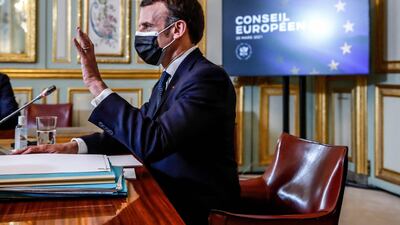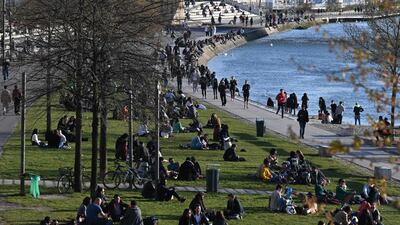Germany imposed tougher border controls on France as health officials warned the third wave of coronavirus will push hospitals to the brink.
France was on Friday listed by Germany as a high-risk zone as the threshold of more than 200 cases per 100,000 people was exceeded in a number of French regions.
Tougher travel rules were also imposed on Austria, Denmark and the Czech Republic.
Anyone arriving from these countries must show a negative Covid-19 test at the German border and undergo a 10-day quarantine, which can be shortened with a second negative test after five days.
Negative tests are required for all airport arrivals in Germany from Tuesday.
Germany previously classified the Moselle border area in France between the two countries as a high-risk zone. The widened reclassification imposes several travel restrictions on the entire border with France, demonstrating the seriousness of the third wave in Europe's two largest economies.
Prof Lothar Wieler, the head of Germany’s Robert Koch Institute, said there could be as many as 100,000 new cases a day in Germany if the spread of virus was not curbed.
He said the third wave in Germany was being driven by the coronavirus variant first identified in south-east England.
"There are clear signals that this wave will be worse than the first two waves," Prof Wieler said. “We have some very difficult weeks ahead of us."
He said it would be possible to reduce the severity of the third wave if Germans did not meet up over Easter.
“We can’t stop this wave any more, but we must try to flatten it as strongly as possible,” he said.
Health Minister Jens Spahn said the country’s health system could hit “breaking point” next month if the surge in case numbers remained unchecked.
The number of new confirmed coronavirus cases in Germany rose by 21,573 on Friday, while the death toll increased by 183.
Mr Spahn called on health officials to be more flexible in offering vaccinations, suggesting unused doses could be offered to anyone aged over 70 at the weekend.
About 10 per cent of Germany’s adult population has received a Covid-19 vaccine, but there is anger over the sluggish distribution in comparison with the UK and US.
European Commission President Ursula von der Leyen on Thursday warned AstraZeneca it must catch up on deliveries to the EU before it is allowed to export doses to other countries.
The German government said on Friday that it would be open to using the Russian-made Sputnik V Covid-19 vaccine once it was approved by the European Medicines Agency.
"EMA approval – which Sputnik does not yet have – would provide the opportunity to use the vaccine in inoculation campaigns in Europe, and it would then also be worth considering for Germany," Ms Merkel’s spokesman Steffen Seibert said.
Third wave hits Europe - in pictures
He refused to be drawn over France's accusation that Moscow was using Sputnik V as a propaganda tool.
Meanwhile, France accused Britain of blackmailing the EU over Covid-19 vaccine deliveries.
French Foreign Minister Jean-Yves Le Drian said the UK was now under pressure because it lacked doses for second vaccinations.
Britain and the European Commission issued a joint statement this week saying they wanted to create a win-win situation on vaccines.
"The UK has taken great pride in vaccinating well with the first dose, except they have a problem with the second dose," Mr Le Drian told France Info radio.
"You are vaccinated when you have had both doses. Today there are as many people vaccinated with both in France as the UK.
"You can't be playing like this, a bit of blackmail, just because you hurried to get people vaccinated with a first shot, and now you're a bit handicapped because you don't have the second one.”
The French government on Friday extended its month-long lockdown on Paris and parts of the north to another three regions.
Medical workers said the French health system faced an “unprecedented violent shock” in less than a month if the spread of the virus was not brought under control.
UK ministers, meanwhile, worried about coronavirus cases from the continent, are prepared to scrap exemptions for all lorry drivers, border officials and other key workers entering the country.
Under a new system, lorry drivers would face mandatory Covid-19 tests to prevent the introduction of new variants, particularly from France, The Telegraph reported.
Scientists said up to 10 per cent of new coronavirus cases in France involve the variant first identified in South Africa.
In an attempt to avoid disruption to food supplies, hauliers could be required to take a lateral flow test when they are in the UK rather than at the border, where long queues can build up and delay deliveries to supermarkets.
All lorry drivers would be required to take a test within 48 hours and every 72 hours thereafter, while Border Force staff involved in cross-Channel work could be required to take three tests a week.
A similar scheme was imposed by French authorities on lorry drivers coming from the UK in December last year to stop the spread of the Covid-19 variant first identified in south-east England.
The French scheme, which was lifted this week, led to bottlenecks at the border because of a lack of testing infrastructure.
UK Prime Minister Boris Johnson hinted at the new testing regime on Wednesday.
“If it’s necessary to bring in testing, then we will do so but I think you should understand the balance of doing that, the disruption to trade and the risk that we are trying to address,” he told MPs.
“We will take a decision, no matter how tough, to interrupt that trade, to interrupt those flows if we think that it is necessary.”





















